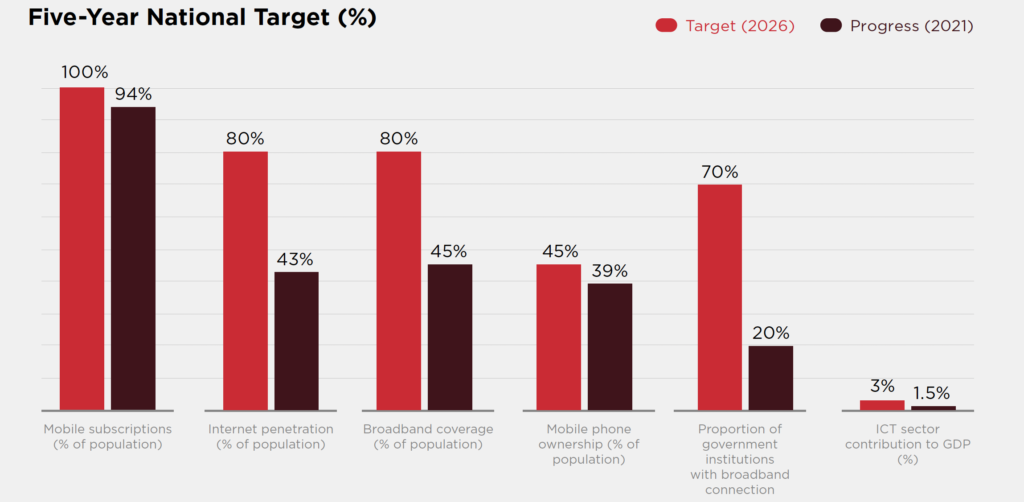The fourth and last part of our blog series on Tanzania’s digitalisation journey looks at the country’s guiding policies and key national targets, their efficiency and impact, and the influencing actors in policymaking.
In the past few years, the Government of Tanzania has shown significant commitment to drive digitalisation efforts and to provide a conducive environment for investment and growth. The current five-year national development plan (FYDP III) places digitalisation at the core of the country’s socio-economic development and has ambitious targets, such as extending broadband coverage to all. The country has already made progress by liberalising the telecommunications sector, making Tanzania’s mobile market one of the most competitive in Africa.
Although Tanzania still needs a clearly defined overarching strategy, the government has already put in place a number of supporting policies and regulations, such as the Cybercrimes Act in 2015, the National ICT Policy in 2016, or the e-Government Act in 2019. As a positive sign of the government’s commitment to increase digital uptake, several policies are undergoing review and additional ones are being drafted to reflect a fast-changing environment.
Efficiency and impact of the current policy environment
Despite progress, the lack of a comprehensive framework on how to implement digitalisation goals, and the challenge of coordinating the work of multiple institutions with different mandates, has led to counterproductive policies. Key areas that deserve attention and greater coordination are foreign investment, taxation, online content regulation, and cloud hosting.
Regulations tend to discourage foreign investment, which significantly impacts the digital and tech sector. One of the main challenges is the uncertainty around capital repatriation. The stock market is not well developed and capital gains taxes in the country are as high as 20% on sales of shares. As a result, tech investment into Tanzania remains minimal – approximately $46 million in 2021, less than a tenth of the funds raised by Kenyan tech firms.
Taxation on digital and mobile services has been a controversial issue in Tanzania. Excessive sector-specific taxes imposed on the mobile industry have resulted in higher transaction costs and constitute a major barrier to adoption. Between June and September 2021, the total volume of peer-to-peer mobile money transactions dropped by 38%, after a new levy was introduced. Push-back from the public and the industry later led the government to reduce the levy on mobile money transactions.
Online content regulations were introduced in 2018 to address online misinformation and imposed an annual license fee to online content and service providers. The additional cost burden of these fees resulted in a steep decline in available local content, as many providers could not afford licenses. At the same time, civil right activists perceived these regulations as an attempt to undermine freedom of speech online. While amendments have been made since, the regulation still serves as a barrier to the production and consumption of local content online.
Regulations on cloud hosting such as those first established by the Finance Act 2021, require taxpayers to maintain electronic documents in a domestic physical server, rather than in cloud-based storage systems, despite their security, reliability, convenience and energy-efficiency. This imposition is hampering both local and regional businesses, reducing their competitiveness due to increased compliance costs.
Policy influences from both domestic and foreign actors are shaping the digital agenda
Tanzania’s strategy in setting its policy agenda on digitalisation has been to protect its sovereignty and core domestic values and goals by giving regulators broad discretionary powers and restricting power centres outside of government structures. This approach poses a risk that digital policies and interventions fail to drive innovation and competition, thereby limiting opportunities for structural change.
Nonetheless, the government’s growing interest in participating in regional and global networks, such as African Telecommunications Union, the International Telecommunication Union , where Tanzania has been voted as a council member, and the East Africa One Network Area Initiative, provides an opportunity for knowledge sharing and influencing. These engagements are crucial to foster more effective digitalisation policies domestically.
To close digitalisation gaps, the government has also initiated large-scale interventions with support from foreign actors and development partners. Tanzania has historically depended on foreign loans or grants from partners such as the World Bank, South Korea, member countries of the European Union, and China to fund its investments in the digital sector. These investments have also come with conditions linked to the strategic priorities of these partners.
Going forward, greater alignment of interventions with national objectives is key to support the development of Tanzania. In addition, greater involvement of actors other than government in implementing these initiatives will be important. There is an opportunity to support the private sector and Civil Society Organisations with long-standing experience in addressing digitalisation gaps for more grassroot change.
Considerations to improve the policy environment
In addition to the policy recommendations identified in the previous parts of this blog series, the government, with the support of multilateral and donor organisations, could consider the following actions to fast-track digitalisation outcomes:
- Implement a comprehensive national digitalisation framework and review and/or update the current cross-sector policies to meet new regulatory demands, especially in the areas of data protection, privacy and digital rights.
- Ensure all policies and strategies are supported by a roadmap that lays out responsible ministries and agencies, budget considerations, and timeframes for implementation.
- Ensure these policies are responsive to the various needs of all segments of society, including those most likely to be left behind.
- Enhance coordination between implementing ministries and agencies to avoid duplication of efforts and align on objectives.
- Promote PPPs as a means of implementing digitalisation programmes for more sustainable and inclusive interventions.
- Ensure that externally funded interventions remain aligned with Tanzania’s national priorities.




